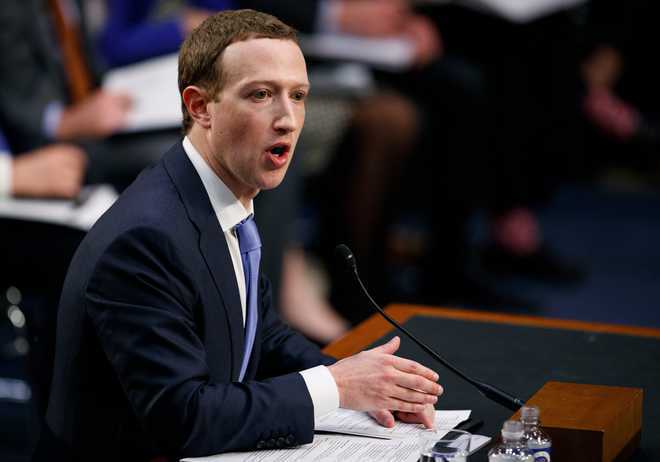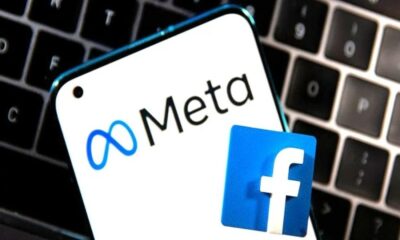The “Kenosha Guard” page was taken down by Facebook after a deadly shooting at a racial justice protest.
Facebook CEO Mark Zuckerberg told employees that the social network failed to remove a page created by a militia group called the Kenosha Guard before a deadly shooting at a protest in Wisconsin because of an “operational mistake.”
Facebook users notified the company of an event organized by the Kenosha Guard that issued a “call to arms” before racial justice protests in Kenosha, Wisconsin. Users reported the event for inciting violence, but received messages stating the content didn’t run afoul of the social network’s rules. The Kenosha Guard event was reported to Facebook at least 455 times.
Protests erupted after Jacob Blake, a 29-year-old Black man, was shot seven times in the back by Kenosha police during an arrest on Sunday and became paralyzed. On Tuesday, two protesters were shot to death and another person was wounded during a protest in that city. Kyle Rittenhouse, a 17-year-old resident of Antioch, Illinois, was accused of killing the two protesters. He was arrested and charged with first-degree intentional homicide and other criminal counts.
Zuckerberg admitted Facebook made the wrong call by not pulling down the Kenosha Guard and event sooner. The page and event did violate new rules the company rolled out last week about “Dangerous Organizations and Individuals,” Zuckerberg told employees in a video posted on his Facebook page on Friday. Under those rules, Facebook would remove accounts, pages and groups formed by organizations and movements that pose a threat to public safety if they discussed potential violence.
Zuckerberg told employees that the team that reviews dangerous organizations and individuals has to understand the “nuances” of how militia groups and conspiracy theory movements work.
“The contractors and the reviewers who the initial complaints were funneled to basically didn’t pick this up,” he said.
After reviewing the content again, the company pulled down the Kenosha Guard page on Wednesday after the deadly shooting. Facebook hasn’t found any evidence that Rittenhouse followed the Kenosha Guard Page or that he was invited to the group’s event. But Facebook’s failure to remove the page more quickly sparked scrutiny from civil rights groups and the company’s employees. Facebook’s employees criticized Zuckerberg’s leadership and questioned whether the company was doing enough to combat hate speech during an internal virtual meeting on Thursday, BuzzFeed reported.
“At what point do we take responsibility for enabling hate filled bile to spread across our services?” one employee reportedly said during the meeting. “Anti semitism, conspiracy, and white supremacy reeks across our services.”
The backlash from employees shows that discontent over the company’s content moderation decisions continues to grow. In June, Facebook employees staged a rare virtual walkout and publicly criticized Zuckerberg after the social network left up a post from President Donald Trump they said could incite violence. In the post, Trump wrote “when the looting starts, the shooting starts” but Facebook determined those remarks didn’t violate its rules against inciting violence. Trump also made the same comments on Twitter but his tweet was labeled for violating the site’s rules against glorifying violence.
Facebook didn’t immediately respond to a request for comment, but spokeswoman Liz Bourgeois told the Kenosha shooting was “painful for everyone, especially our Black community.”
“The Kenosha Guard Event and Page violated our new policy on militia organizations and have been removed on that basis. We launched this policy last week and we’re still scaling up our enforcement of it by a team of specialists on our Dangerous Organizations team,” she said.
Earlier this month, Facebook said it took down 790 groups, 100 pages and 1,500 ads tied to the right-wing conspiracy theory known as QAnon that falsely claims there’s a “deep state” plot against Trump and his supporters. Civil rights groups organized a campaign this year calling on businesses to stop buying ads on Facebook in July, until the social network does more to combat hate speech.

 Business4 weeks ago
Business4 weeks ago
 Health3 weeks ago
Health3 weeks ago
 Technology3 weeks ago
Technology3 weeks ago
 Sports3 weeks ago
Sports3 weeks ago
 Science3 weeks ago
Science3 weeks ago
 Business2 weeks ago
Business2 weeks ago
 Science2 weeks ago
Science2 weeks ago
 Science1 week ago
Science1 week ago















